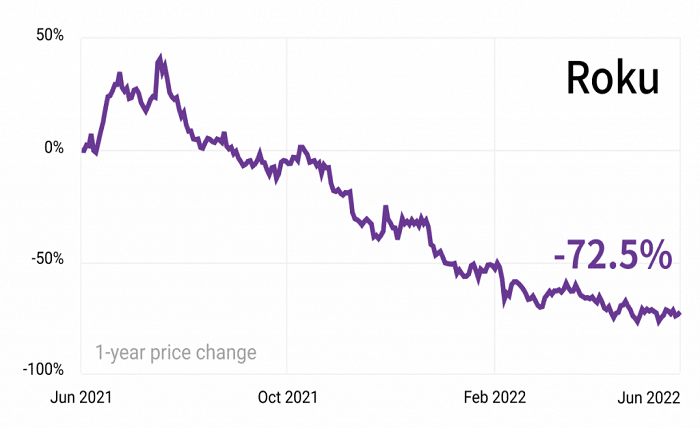
Roku, Inc., a leading player in the streaming industry, has revolutionized the way people consume content. Since its inception, Roku has become synonymous with easy-to-use streaming devices, offering consumers access to their favorite TV shows, movies, and music. With the company’s growing presence in the media landscape, Roku’s stock price on NASDAQ has attracted significant attention from investors and analysts alike. In this post, we will dive deep into Roku’s stock performance, factors influencing its value, and what potential investors should know about Roku stock price on NASDAQ.
Roku Stock Price on NASDAQ
Roku’s stock, listed under the ticker symbol ROKU, is traded on the NASDAQ exchange. The company’s stock price has witnessed significant fluctuations, reflecting changes in both the company’s performance and the broader market dynamics. Roku’s stock price on NASDAQ has been impacted by various factors including market sentiment, competition in the streaming industry, and Roku’s financial performance. By analyzing historical data and key metrics, investors can gain valuable insights into the stock’s volatility and its growth potential.
The Roku stock price on NASDAQ has experienced highs and lows over the years, and understanding these fluctuations can help investors make more informed decisions. Whether you’re a seasoned investor or new to the stock market, understanding the key drivers of Roku’s stock price is essential for assessing its investment viability.
Factors Influencing Roku Stock Price on NASDAQ
Roku’s stock price on NASDAQ is affected by multiple factors, ranging from quarterly earnings reports to broader industry trends. For instance, Roku’s growth in active users and total streaming hours can significantly impact its valuation. A surge in subscriber numbers often leads to a spike in Roku’s stock price, as it suggests the company is expanding its market share. Additionally, any new partnerships, acquisitions, or product innovations by Roku can create investor optimism, pushing the stock price higher.
Conversely, negative news such as weak earnings reports, regulatory challenges, or increased competition from streaming giants like Amazon and Google can drag the stock price down. Keeping track of both internal and external factors is crucial for understanding how the Roku stock price on NASDAQ can evolve in the short and long term.
Historical Trends of Roku Stock Price on NASDAQ
To get a better sense of roku stock it’s important to examine its historical performance. Since Roku’s initial public offering (IPO) in September 2017, the stock has experienced significant volatility. It saw a substantial rise in 2020, driven by the streaming boom during the COVID-19 pandemic, when more people turned to digital platforms for entertainment. However, the stock has also seen considerable dips in subsequent years, particularly when market conditions or the company’s financial results did not meet expectations.
The historical trends of Roku’s stock price on NASDAQ offer valuable insights into investor behavior and sentiment. By looking at the stock’s price movements, you can identify patterns, understand its correlation with broader market events, and make more strategic investment choices.
Roku Stock Price vs. Industry Competitors
Roku’s stock price performance on NASDAQ cannot be evaluated in isolation. A key factor to consider is how Roku stock price compares to its competitors in the streaming and tech industry. Companies like Amazon, Apple, and Google, which also offer streaming services, have created significant competition for Roku. Analyzing the stock prices of these companies in comparison to Roku can provide a clearer understanding of Roku’s market position.
At times, Roku’s stock price may outperform its competitors due to unique features or innovations it brings to the market. On the other hand, during periods of heavy competition or strategic missteps, Roku’s stock price may lag behind. Therefore, examining how Roku stock price on NASDAQ compares to its peers can offer insights into the company’s strengths, weaknesses, and long-term prospects.
How to Analyze Roku Stock Price on NASDAQ
Investors looking to understand Roku stock price on NASDAQ should utilize a variety of analytical tools and metrics. Key performance indicators (KPIs) such as earnings per share (EPS), price-to-earnings (P/E) ratio, and market capitalization are essential for evaluating the stock’s valuation. Analyzing Roku’s quarterly earnings reports and revenue growth also offers a good indication of how the stock is likely to perform in the future.
Technical analysis can also be useful for tracking short-term price movements. This method involves studying historical price charts, moving averages, and other market indicators to predict potential price trends. Combining both fundamental and technical analysis will give investors a comprehensive view of Roku stock price on NASDAQ, helping them make more informed decisions.
Predicting Future Trends for Roku Stock Price
Predicting the future of Roku stock price on NASDAQ is inherently challenging due to the volatility of the stock market. However, by analyzing Roku’s financial performance, market trends, and industry developments, investors can make educated predictions about where the stock may be headed. If Roku continues to grow its user base, expand its content offerings, and enhance its advertising capabilities, its stock price may see upward movement in the coming years.
Additionally, if the broader streaming market remains strong and Roku successfully navigates competitive pressures, its stock could continue to perform well. However, any major disruptions in the industry, such as regulatory changes or technological advancements by competitors, could present risks to Roku’s stock price.
Read more about : however synonym
Investing in Roku Stock: Is It a Good Buy?
Given the potential for growth and the risks involved, is Roku stock price on NASDAQ a good investment? For long-term investors, Roku’s stock offers significant upside potential, particularly if the company can maintain its leadership in the streaming industry. The company’s strong brand, user growth, and advertising revenue make it a promising option for investors looking to capitalize on the booming streaming market.
However, like any investment, Roku’s stock comes with risks. Increased competition, changes in consumer behavior, and economic uncertainties can all affect its performance. Therefore, investors should carefully consider these factors before deciding to invest in Roku stock. As with any stock, diversifying your portfolio and conducting thorough research is key to minimizing risks and maximizing returns.
How to Buy Roku Stock on NASDAQ
Buying Roku stock on NASDAQ is simple and can be done through a brokerage account. Most major online brokers offer access to NASDAQ-listed stocks, including Roku. Before purchasing, it’s essential to set a budget and determine how much you’re willing to invest in Roku. You can purchase stock via market orders, limit orders, or through exchange-traded funds (ETFs) that include Roku as part of their holdings.
Once you’ve chosen your investment strategy, monitor Roku’s stock price regularly to ensure it aligns with your investment goals. If you’re new to investing, it’s advisable to start small and gradually increase your exposure to Roku stock as you become more familiar with the market.
The Impact of Economic and Market Conditions on Roku Stock Price
Economic conditions can significantly impact Roku stock price on NASDAQ. Factors such as inflation, interest rates, and consumer spending habits all play a role in shaping investor sentiment. For example, during times of economic uncertainty, consumer spending on entertainment services like streaming may decline, which can negatively affect Roku’s stock price. Similarly, if interest rates rise, borrowing costs for companies like Roku could increase, putting pressure on its profitability.
On the other hand, a strong economy and high consumer confidence can lead to increased demand for Roku’s products and services, potentially driving the stock price higher. As an investor, it’s crucial to stay informed about macroeconomic trends and market conditions that can impact the Roku stock price on NASDAQ.
Conclusion
In conclusion, Roku stock price on NASDAQ offers both potential rewards and risks. The company’s dominance in the streaming industry, coupled with its growing user base and innovative advertising solutions, suggests a positive future outlook. However, like all investments, Roku stock comes with its own set of risks, including fierce competition and changing market conditions.
For investors looking for exposure to the tech and streaming sectors, Roku stock represents an opportunity for growth, though it is essential to monitor its performance closely and conduct thorough research before investing. With the right strategy and risk management, Roku’s stock could offer substantial returns in the years to come.
FAQs
1. What is Roku stock price on NASDAQ? Roku’s stock price on NASDAQ fluctuates based on various factors, including company performance, market trends, and investor sentiment. It is traded under the ticker symbol ROKU.
2. How can I invest in Roku stock? You can invest in Roku stock through a brokerage account. Simply open an account with a broker that offers access to NASDAQ-listed stocks, fund your account, and place an order for Roku stock.
3. Why is Roku stock price so volatile? Roku’s stock price is influenced by multiple factors, including the company’s financial performance, competition, and broader market conditions. These factors contribute to fluctuations in the stock price.
4. What are the main competitors to Roku in the streaming industry? Roku competes with major players like Amazon Fire TV, Apple TV, and Google Chromecast. These companies offer similar streaming devices and services, which can impact Roku’s market share.
5. Is Roku stock a good investment? Roku stock has strong growth potential, but it also comes with risks. Investors should assess their risk tolerance and monitor market conditions before deciding to invest in Roku.





